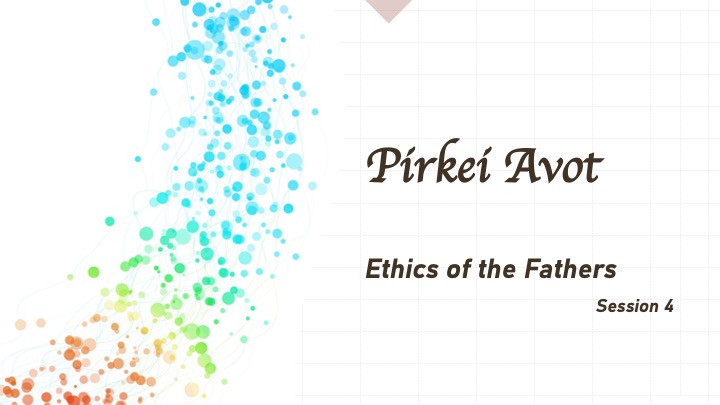Pirkei Avot Lesson 4
Sandy Kress

Ethics of the Fathers – Lesson Plan – Session Four
I. Introduction
II. Verses to Consider and Discuss
A. Hillel was accustomed to say: One who seeks renown loses one’s reputation; one who does not increase (Bible learning) decreases it; one who refuses to teach (Bible) deserves death; and one who makes unworthy use of the (Bible’s) crown shall fade away. 1:13
Questions:
1. What do these questions have to do with the broader questions of life: How should we structure our lives? What should guide us most in what we think and how we act?
2. What is the Bible for us; what’s its role, and how are we to treat/use it in shaping our lives?
3. How are we to treat honor in our lives? Why?
4. Hillel’s point about death seems harsh on first encounter. How might it actually be true?
B. Shammai says: Make your Bible study a fixed practice; say little and do much; and greet everyone with a pleasant countenance. 1:15
Questions:
1. Shammai’s guidance seems to be close to Hillel’s, and it some ways it is. Can you see how they differ?
2. I think Shammai’s last two pieces of guidance here are actually drawn from close Bible study. Do you agree? What’s he advising us to place importance on in how we live our lives, and why?
C. Rabban Gamliel was accustomed to say: Make a teacher for yourself and remove yourself from uncertainty; and do not tithe by estimating (instead of measuring). 1:16
Questions:
1. We’ve already seen in 1:6 the need to accept upon ourselves a teacher, but here we see its usefulness specifically as to removing ourselves from uncertainty. What does that mean, and why is it important?
2. Why do you think Gamliel illustrates this by stressing the importance of getting the tithe right?
3. Do you think this advice has anything to do as well with “the teacher inside of us?” How?
III. Conclusion – what are the takeaways from our study today?